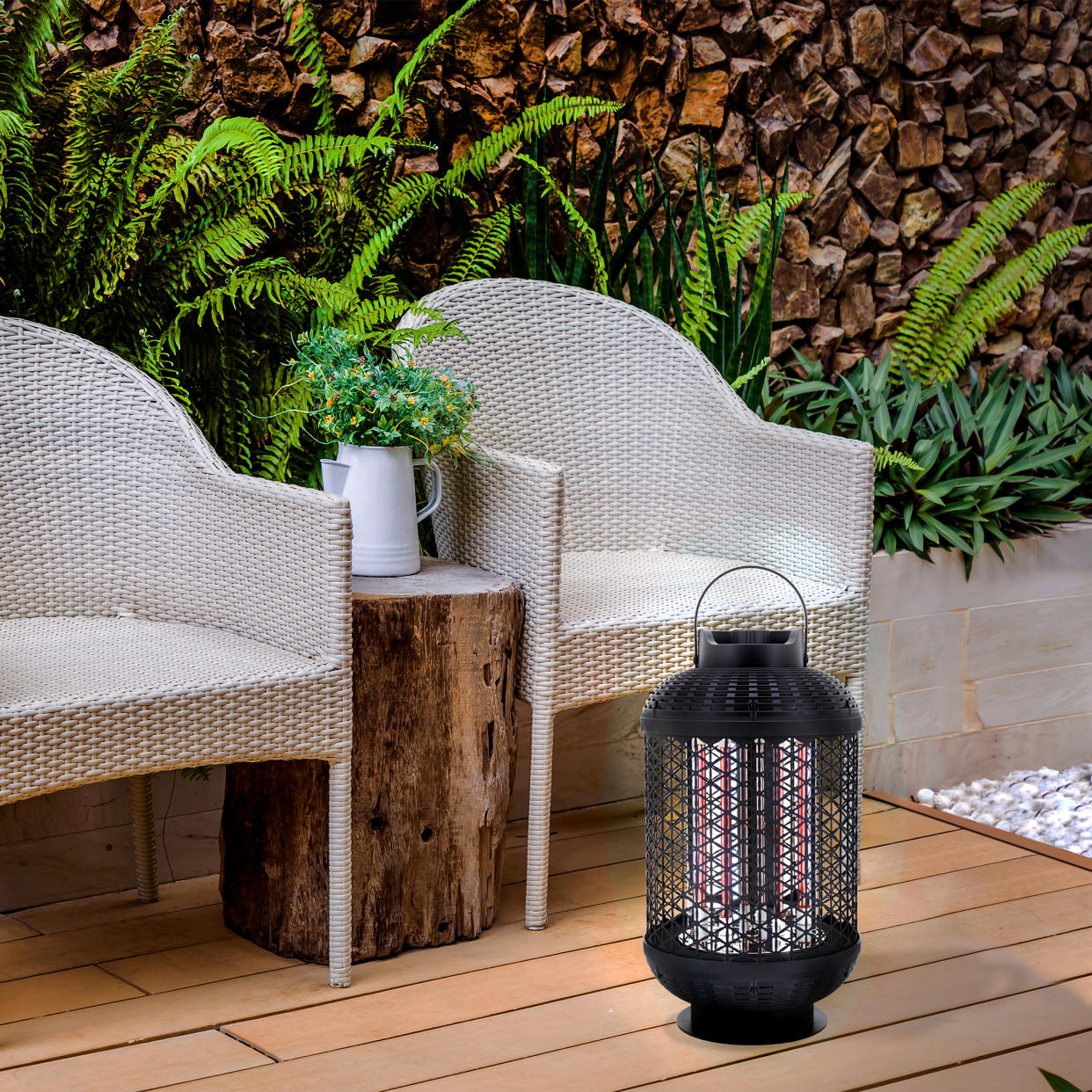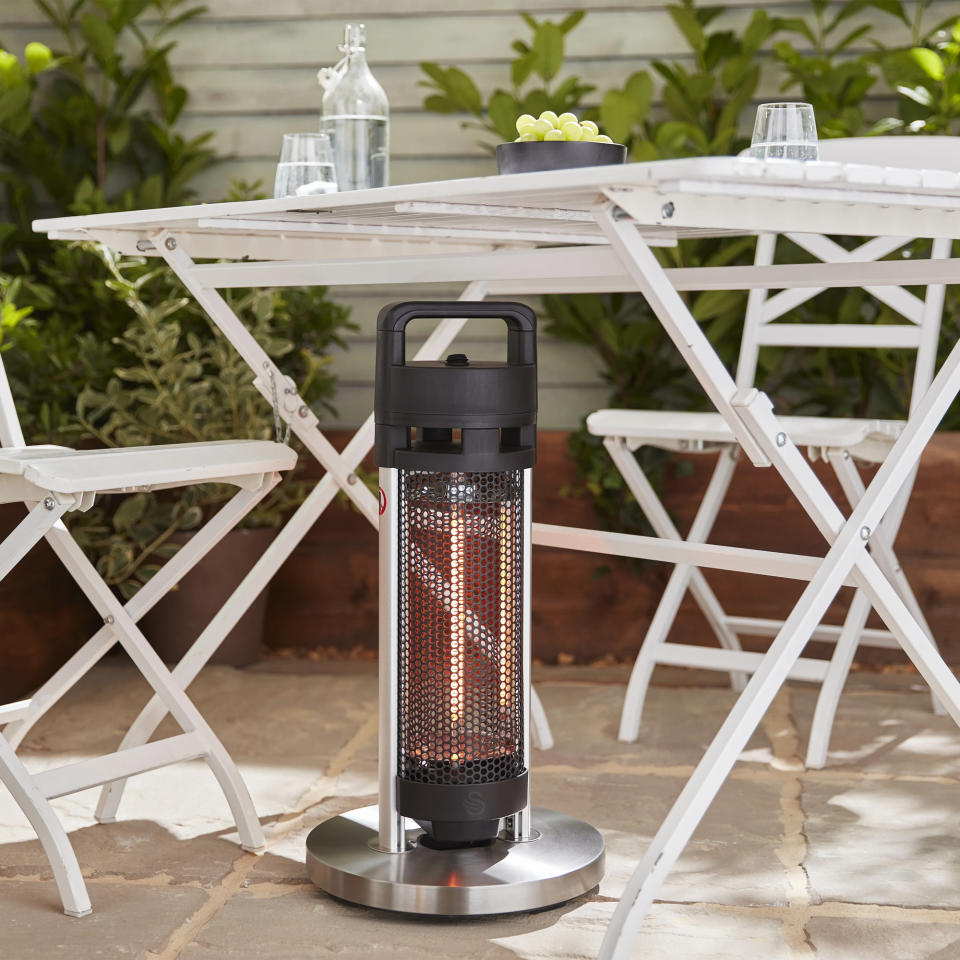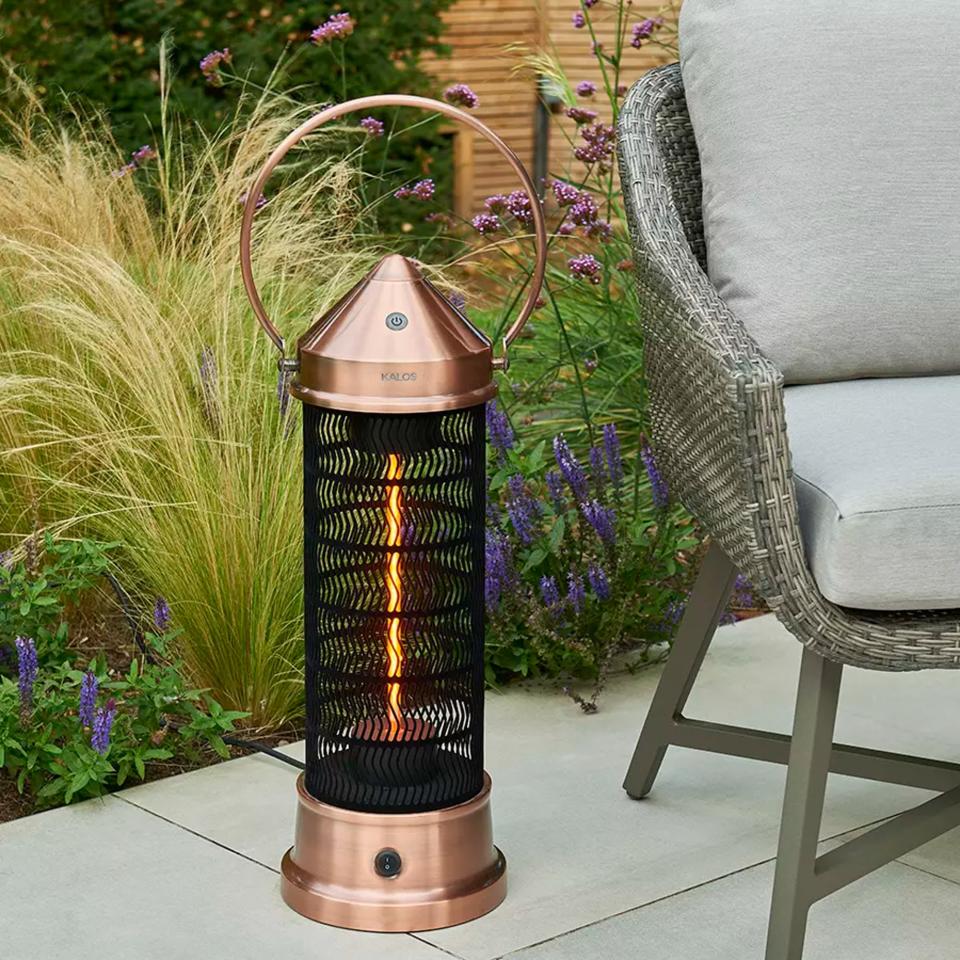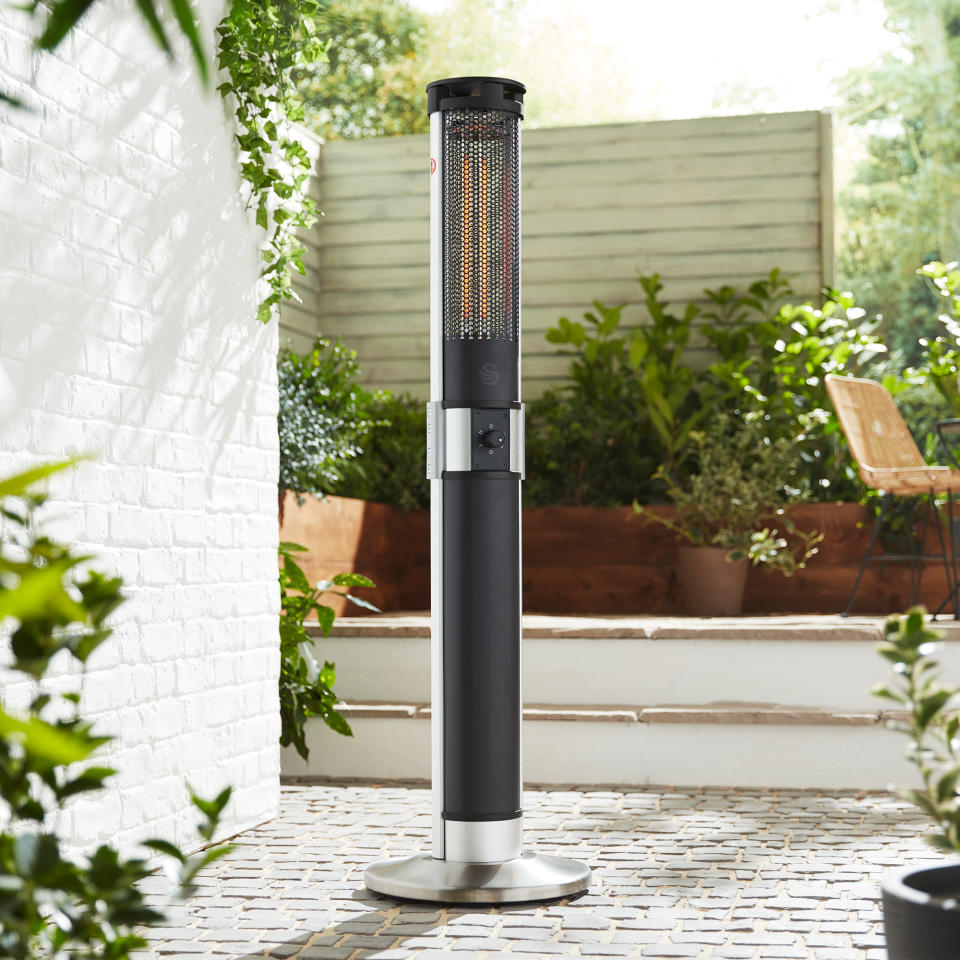Electric vs gas patio heater – which is the best fuel type for your outdoor heater?

We all love to spend time outside enjoying the fresh air, but once there’s a chill in the air, you may well be reaching for one of the best patio heaters to accompany your alfresco activities.
However, the fuel type that you choose to power your outdoor heater can be the difference between an easy and convenient source of heat, and one that’s so much faff you’ll be wrapping yourself in blankets instead. As such, you're not alone in weighing up the pros and cons of an electric versus a gas patio heater.
Having reviewed several patio heaters over the last few months – from the super easy-to-use electric Blumfeldt Heat Guru 360 Infrared Electric Patio Heater to the powerful Outsunny 11.2kw Pyramid Gas Patio Heater – I’ve experienced the capabilities and drawbacks of both gas and electric-powered patio heaters.
And, as someone who grows cold easily but doesn't want to spend a fortune on staying warm outdoors, I’ve put together my thoughts on electric vs gas patio heaters to help you choose which is the best option for you.

Electric vs gas patio heater: what to consider
When it comes to choosing a fuel type for your patio heater, the two main things to consider are where you plan to use it and how often you plan to use it.
Why does location matter so much? Of the two fuel types, gas gives the most choice over where the patio heater is placed. As bottles of gas are portable, they’ll go wherever your patio heater does, meaning you can have heat at the end of the garden or by an outbuilding, far away from electrical sockets. So there’s no need to restrict your garden ideas.
Electric patio heaters need to be plugged in, which limits how far away from a socket they can be placed.
While both fuel types can be costly to run, they heat differently, impacting how much fuel you’ll need to use over time. Gas heaters are good at heating larger areas for example, so you may not need to have them on constantly, or on the highest setting once the area is comfortably warm. Whereas electric patio heaters tend to have a more limited reach that’s extinguished fairly quickly when they’re turned off. Both fuel types will be more effective in sheltered areas.
You’ll also need to consider storage. Whilst electric heaters can be small or medium-sized, and therefore more easily stored inside or in a shed when not in use, many gas patio heaters are tall and bulky, therefore requiring either a cover, partial disassembly, or a good-sized outbuilding for storage.

Electric patio heater: pros and cons
One of the big pluses of electric patio heaters is there’s a huge choice in terms of size and style – you can buy tabletop patio heaters, wall-mounted heaters, tall freestanding models and many more focal-point designs, like the stylish Kettler Kalos Copper Lantern Patio Heater I reviewed.
Electrical patio heaters provide instant heat, rather than taking a while to warm up like a gas patio heater, and many come with a remote control, so there’s no need to get up to change settings – you can stay snug sitting on some of the best garden furniture.
‘Electric patio heaters are lightweight, more environmentally friendly than gas, and emit no smoke, making them a comfortable and practical choice,’ says Amy Stubbs, marketing lead at British Garden Centres. No annoying the neighbours with smoke from one of the best fire pits on the market then.
Even better, being powered by electric means no stocking up on gas bottles – they’re plug and play.
However, it’s important to know that to comply with current UK/EU safety standards, electric heaters can’t be supplied with an attached lead longer than 1.8m, which may restrict where they’re positioned. To power your patio heater, you’ll need an outdoor socket nearby.
If you don’t have an outdoor power socket, and aren't planning to get one installed, you can use an outdoor extension lead, but you shouldn’t ever use the same sort of basic no-waterproof extension lead that you'd use inside the home.
You can either buy a compatible extension with your heater, or use an outdoor extension lead, like these from Amazon, that’s labelled as suitable for outdoor heated products.

Gas patio heater: pros and cons
The main plus point of a gas patio heater vs electric is their flexibility. You can place a gas patio heater almost anywhere outdoors without having to consider extension cables or power sources, freeing you from reliance on an outdoor socket.
Most gas patio heaters also allow you to choose different levels of heat to suit. They’re great at heating larger areas and will warm you up quickly once they get going as they produce more heat. Perfect if you’re keen on throwing an impromptu cook-out with one of the best BBQs.
What can cause a headache with gas patio heaters is that it’s often not as simple as going to buy a bottle of patio gas or propane to power them. You’ll need to check the fitting on the supplied regulator when you buy your bottle to make sure it’s compatible or if you’ll need to buy an additional regulator. Some are screw-in, others are a push-on, while the gas bottle itself may connect either at the side or on top.
Plus, gas is currently a lot more expensive than electricity, so running costs are usually far higher than an electric model. And whilst the heat that a gas patio heater produces is often more powerful, it can also be very inefficent, with much of the heat from the fuel you're burning rising straight into the air.

Which is more affordable? Electric vs gas patio heater
While both types of heater tend to be fairly equally priced when you compare power output side by side, there are more smaller and medium-sized electric heaters to choose from. This means that if you’re on a budget, electric is more likely to be the affordable choice, with a large selection of products in the £50-£200 price bracket.
The electric Devola Core 2kW Freestanding Patio Heater, for example, retails around the £50 mark. Infrared electric heaters tend to be a little more expensive.
There are gas patio heaters available for under £100, but, in my experience, the build quality can be poor. You'll need to spend around £200+ for a decent gas patio heater.
However, what’s probably more important to consider, especially if you plan to use your patio heater frequently, is running costs. These can vary for electric patio heaters as they’re dependent on how much wattage the heater requires, and whether it has different heat settings.
However, gas patio heaters will pretty much always be costlier to run than electric at current energy prices – plus it’s worth noting that up to 40% of the heat goes straight up into the air. ‘They also take longer to warm up and are less efficient,’ says Amy Stubb, ‘and they produce more CO2.’

Which is more portable? Electric vs gas patio heater
A gas patio heater ultimately offers the most portability as it isn't reliant on proximity to an outdoor power socket like an electric patio heater is. You can place a gas patio heater wherever you can carry both it and the gas canister to in the garden. This means a gas patio heater is a great option for large gardens or outdoor spaces where you're gathering points are far from the house.
That said, although both gas and electric patio heaters come in a range of sizes, in general, gas models tend to be the larger, heavier, and more unwieldy of the two. So you may not want to move it about the garden that often.
‘Gas patio heaters tend to be bulkier and also less portable since they require attachment to a gas pipe and canister,’ explains Amy Stubbs at British Garden Centres. ‘Whereas electric patio heaters are perfect for small gardens. Some electric models can even be hung from parasols or awnings, requiring no footprint at all’. However, you will generally still need access to a power socket, unless you find a rechargeable option.

Which is easier to maintain? Electric vs gas patio heater
Patio heaters tend to be low maintenance in general – all they’ll need is a wipe down with a damp cloth if they become dirty.
However, gas patio heaters tend to be a little higher maintenance when it comes to keeping them working efficiently. If you leave them outside when not in use, it’s easy for them to become a place for insects to nest, or home to dirt deposits inside. This can potentially cause a blockage for the gas supply. After any period of non-use, check the burner, connections and hose for corrosion and damage to avoid problems with the gas flame.
You'll also need to factor in refilling gas canisters, which takes a little more planning ahead than simply plugging your heater into the nearest electrical power socket. As long as you're garden is equipped with an outdoor power socket that is.

Are electric patio heaters as good as gas?
If you’re heating a small area, or there’s only a handful of people outside, so they won’t be far away from the heater, then yes, electric patio heaters are every bit as good as gas. However, the further away you move from them, or if you’re not positioned in their glow, the less you’ll feel the heat. And when they’re turned off, the heat will fade fast, unlike with a gas patio heater, which tend to keep the space warmer depending on the weather conditions. For larger gatherings, especially those not near a power supply, a gas patio heater can be the better choice.
Do electric patio heaters use a lot of electricity?
Potentially, yes, an electric patio heater can use a lot of electricity, but it all depends on their wattage, what setting you usually run them on, and how often you use it.
Smaller heaters generally use less electricity than larger models. For example, an electric patio heater that has a setting of 600W, at a rate of 34p per kWh, would cost just 20p an hour to run, while one that has a heat output of 2000W would cost 68p an hour – making it more than three times as expensive to power.
Are gas patio heaters expensive to run?
The short answer is yes, especially with regular use – but it all depends on which type of gas you’re purchasing (eg patio gas, propane, butane) and the size of gas bottle you buy, as to how expensive.
With daily use of a gas patio heater with a 13.5Kw burner for example, you may need to replace/refill a 10kg bottle a couple of times a month. For comparison, the average burner size on a gas hob is 1-3Kw. Just Patio Heaters estimate that a 13kg Calor gas bottle will last around 15 hours in the average gas patio heater if left on full power.
Verdict: electric vs gas patio heater
So which gets my vote in the electric vs. gas patio debate? Well, for me it has to be electric.
Whilst electric patio heaters can vary on running costs according to their wattage, they are still by far the cheaper to run based on current energy costs. They're also more affordable to purchase initially, tend to offer more size and style options, produce less CO2, and are easy and convenient to use – as long as you have access to an electrical socket.
If you have a large garden and don't want to be limited in the placement of your outdoor heater, or to have extension cables running from the house or garage, then the freedom of placement that a gas patio heater allows may work better for you. You'll just need to research the cost of gas, and make the decision on whether those high running costs are worth it for the powerful heat a gas patio heater can dish out.

